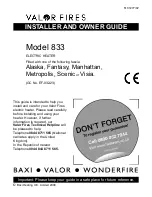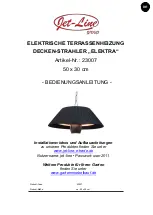
User’s Manual
–
A
REBO
S Ceiling heater 2000W
8
5.
Cleaning and maintenance
4.1 General
•
Turn off the switch before servicing and allow the unit to cool down completely.
•
Clean the outer cover of the heater with a soft, damp cloth. If necessary, you can also use a
mild detergent. After cleaning, dry the device with a soft cloth.
•
Do not use alcohol, gasoline, abrasive cleaners, furniture polish or coarse brushes to clean
the heater. This can lead to damage or wear on the surface of the heater.
•
Although this outdoor heating is permitted (balcony and terraces), do not immerse the
heater in water for your safety. Wait until the device has dried completely before use.
4.2 Storage
•
If the heater is not used for an extended period of time, store it in a cool, dry place. To avoid
dust and debris, use the original packaging to repack the unit.
4.3 Troubleshooting
•
If the heater does not work, please check the following:
-
Check if the current in the main fuse is working.
-
Make sure that the power switch is turned on.
5. Disposal instruction
5.1 Disposal of the packaging
•
Please make reference to the guidelines and standards for appropriate disposal of the packaging
valid in your region. In part, the package may consist of plastic bags - watch this respect, with
special care to ensure that this is not out of the reach of children. There is a risk of suffocation!
5.2 Disposal of waste equipment
•
Equipment must be disposed of in accordance with the rules and regulations of the local waste
disposal.
•
At the end of the long life of your article, please dispose of the valuable raw materials for proper
disposal so that proper recycling can take place. If you are not sure how to proceed, the local
waste disposal companies or recycling centers are happy to help.
5
.3 Meaning of the “dustbin”
The symbol of the crossed-out dustbin on batteries or accumulators indicates that
they must not be disposed of with household waste at the end of their service
life. If batteries or accumulators contain mercury (Hg), cadmium (Cd) or lead (Pb),
you will find the respective chemical symbol below the symbol of the crossed-out
trash can. You are legally obliged to return old batteries and accumulators after
use. You can do this free of charge in a retail store or at another collection point
near you. Addresses of suitable collection points can be obtained from your city
or local government.
Batteries may contain substances that are harmful to the environment and
human health. Special care must be taken when handling batteries containing lithium due to the
particular risks involved. The separate collection and recycling of old batteries and accumulators is




























